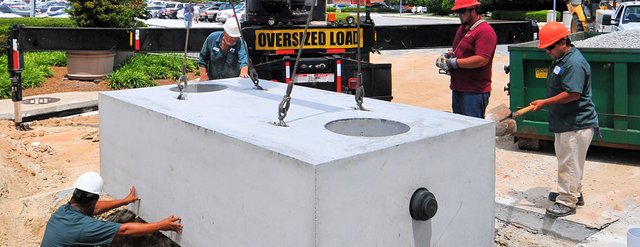Why does your restaurant greese trap needs cleaning?

Every food service establishment is required to have an interior or exterior commercial grease trap. Interceptors are installed to trap FOG (fats, oil, grease) and leftover food from entering the sewer lines. When FOG enters the sanitary sewer system it causes blockages and sewer overflows. This is why local governing agency regulate grease trap maintenance closely. In addition to that, not cleaning your grease interceptors will cause back-ups inside your grease traps inspection, pumping and cleaning which can result in closed or lost business. The local government has authority to fine companies if they do not clean or replace grease traps according to the rules.
Grease trap cleaning begins with scraping and pumping of fats, grease and oils', 'FOG from the restaurant grease traps. When the sludge is removed and the grease interceptor is clean professional plumbers perform a grease trap system inspection to ensure that everything is working properly.
One of the common causes of a commercial septic system failure is the lack of pumping of commercial grease traps. Sewer Experts plumber recommends that the grease (one foot deep) floating on top of the four feet tank should be pumped out. The sludge and dirt at the bottom of the tank should be also removed. However, even if the grease deposit has not reached the 25% level many municipal health departments still require to complete pumping of the grease trap at least twice a year.
Denver Plumber Sewer Experts specializes in grease trap installation. We provide scheduled grease traps inspection, pumping and cleaning as well as comprehensive drain and sewer line cleaning and preventative maintenance services.
The European Court of Human Rights has recently ruled that a local authority was justified in not treating with priority a social housing request by an immigrant, whose son was conditionally allowed to stay in the UK. The applicant in the case, Husenatu Bah, is a Sierra Leonean national who lives in London. Having unsuccessfully claimed asylum in the United Kingdom following her arrival there in 2000, she was granted indefinite leave in 2005 to remain in the UK. Her son, born in 1994, joined her in London in 2007. He was allowed to enter and remain in the UK on the condition that he did not have recourse to public funds. Shortly after her son arrived, Ms Bah was asked to leave the room she was renting, as her landlord was unwilling to accommodate her son. Ms Bah applied to the London Borough of Southwark for priority treatment in obtaining social housing. Individuals who become unintentionally homeless and have minor children are normally treated with priority by the local authority when deciding on the provision of social housing. However, because Ms Bah s son had only been granted leave to remain in the United Kingdom on the condition that he did not have recourse to public funds, he could not be taken into account in assessing whether she had a priority need for housing assistance. The Court recalled that there is no right under Article 8 of the Convention to be provided with social housing. However, where a State decides to provide such a benefit, it must do so in a way that is not discriminatory. Ms Bah s son had been allowed to enter and remain in the UK on the explicit condition that he would not use public funds. It had therefore been because of his conditional immigration status, and not because he was a Sierra Leone national, that his mother had been denied priority treatment under the housing legislation. Given the shortage of social housing, it was legitimate for the national authorities to put in place criteria for its allocation, as long as the criteria were not arbitrary or discriminatory.
Immigration Lawyer Houston, TX Herrera Law Firm